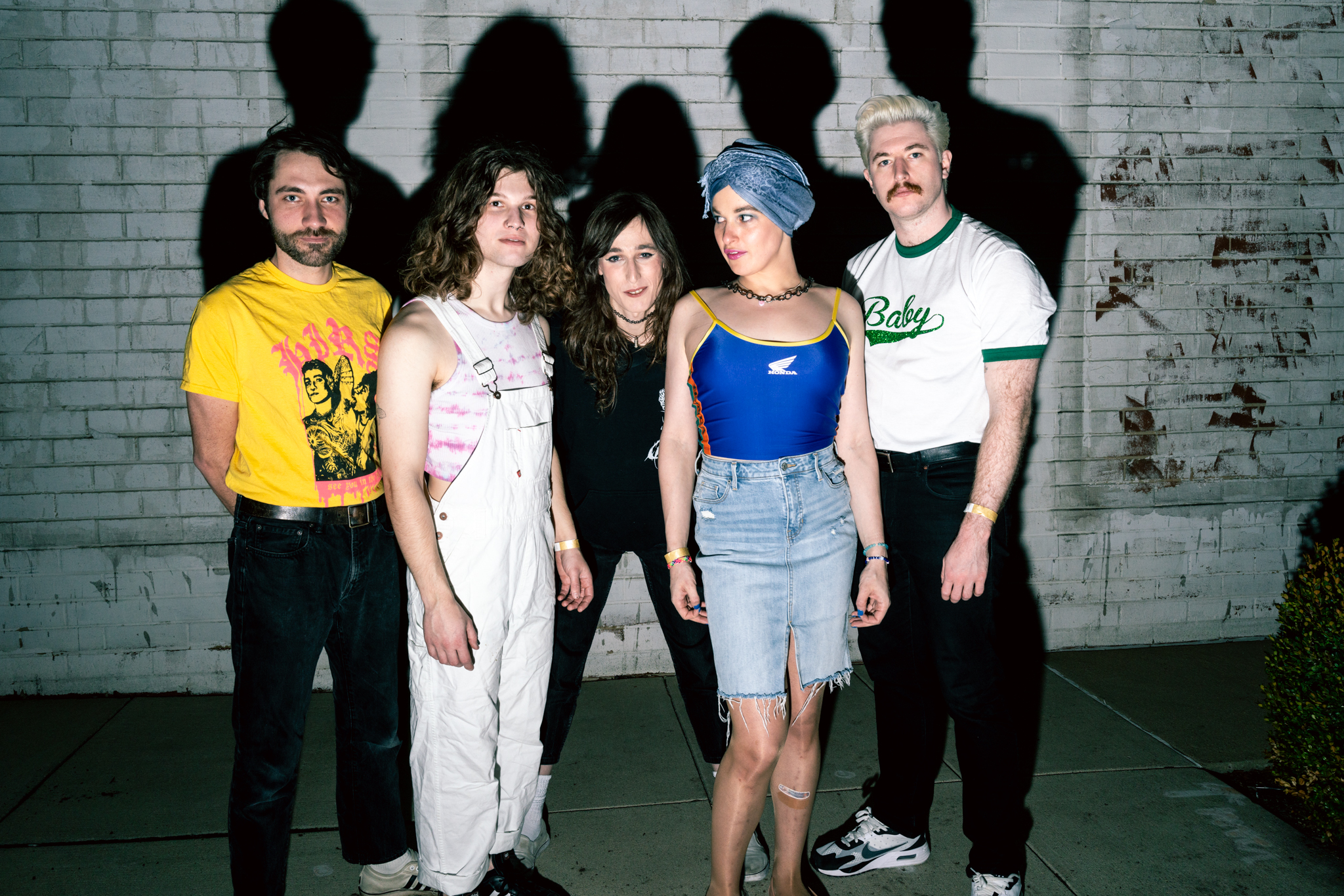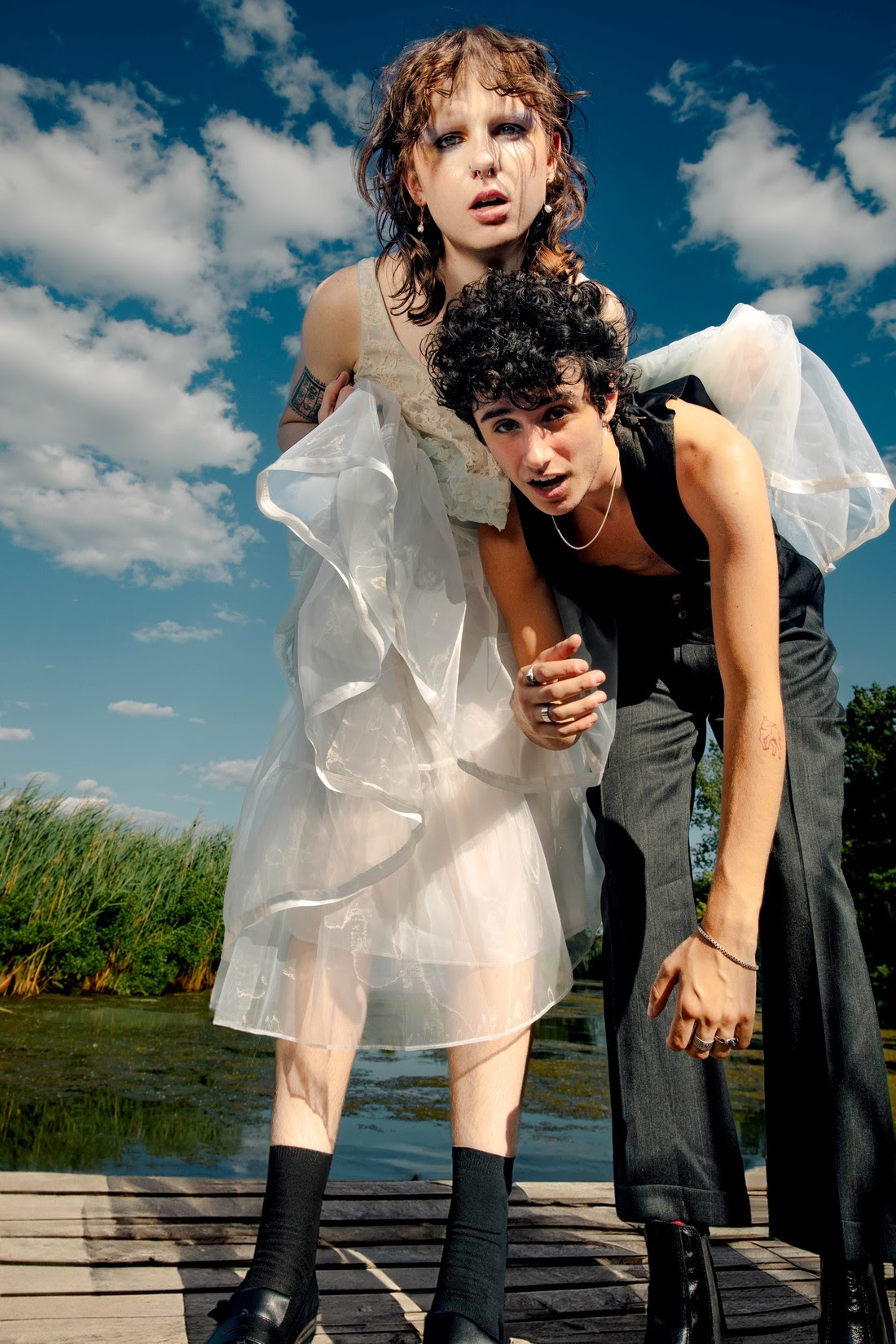Where the fuck did all the heroes go? And when was the last time "the future" was encouraging? These are some of the questions that darted through my head after talking with the Washington, DC-based musician Jael Holzman, who is the lead vocalist and songwriter for the punk group Ekko Astral. The five-piece initially began as a graduate thesis project and a space for creative venting among friends, but has turned into a powerful band that demands a better future on their revitalizing forthcoming debut album pink balloons.
Holzman, who is also an energy and climate reporter when she's not performing in Ekko, is precise and effective with her words. "I would say that currently we don't have heroes in our culture," she said. "What I mean by that is: more and more figures need to be using their art with a positive vision for the future. When we recorded pink balloons, before we went into the studio, I sat down with the rest of the band the night before and I said, 'Let's make this album with a goal in mind of making people dream of a better future.'"
"When I look out into the artist landscape -- people at the top of the charts, but also random bands recommended on Spotify -- I see that everyone is selling their music. And that's great -- we all need to make money. But I think people are a little lost in that due to the way that the systems of capital are structured right now."
I shouldn't be surprised by our chat's sense of invigoration. It's the same feeling I get when I listen to Ekko Astral's fierce debut pink balloons. Although the album goes through phases of ravenous, disorienting distortion, it also has tender observations about mortality and age, and Ekko Astral don't fall down an apocalyptic rabbit hole. pink balloons accurately captures this shit-hole time, but feels activating instead of depressingly hopeless. "I think we're all very tired of getting up every day," Holzman said. "Having to log on to our mobile computer, which will then spit out 10,000 reasons why the next day sucks with all the other problems we've inherited."
"It's easy, at this moment, to treat music as a distraction. But I've always been a fan of the Lynch-ian approach, where you instead hold a mirror up to someone and you show them the real that they've been experiencing the whole time."
Ekko Astral began as a way for Holzman and Liam Hughes to make music during the pandemic. Hughes was studying to get his masters at American University, which gave him access to the university's recording studio. They decided to make some garage rock: Hughes could use it as his thesis, while Holzman could use it as a way to "vent about what it's like to be me right now," as she put it. Holzman came out as trans in 2021 and, at first, the project was a way of coping with her transition in lockdown. Soon after, Miri Tyler -- who performs in another group called Pretty Bitter -- joined on bass and then moved to drums; Guinevere Tully took over bass and then an old high school friend, Sam Elmore, rounded out the group with additional guitar.
Holzman isn't the only one who used the group as a means of self-discovery and understanding. "When I joined Ekko Astral, it was because I wanted to play punk rock with someone who could relate to my gender, which I had only really began to explore at the time," Tyler shared via email. "It gave me the opportunity to fully express my transness within the context of the DIY/punk community I had come up in."
"Every time I see a trans person with a big smile on their face getting rocked around in the pit, it's a reminder that I'm helping make their life a little more tolerable," Tully continued. "To me, pink balloons is about navigating this dying system we live in as a trans person. It's difficult, but we galvanize one another and find reasons to smile despite what's happening to us and around us. If we don't laugh about it, we'll start to cry."
I asked Holzman about how she wanted her identity and the story to be written about in regards to the music, and if she's thought about how the group's queerness might be politicized. "That's a huge issue," she said. "A lot of people have typecasted us around my trans identity without really listening to the messages in pink ballons when we send it to them. This is an album for everybody about universal struggles that should not be put into a box."
"If you read our lyrics, in no way are we making any political statements. Because language now has become so politicized that you can say anything and it's a political statement. Who you are cannot be a political statement, because then it can be questioned or debated," she said adamantly. Politicizing one's identity is an insidious act of violence, and the type of nonsensical bullshit that Ekko Astral are fighting against with their music.
"It's not like I'm writing songs that I would only write because I'm trans, or I'm writing articles that I would only write because I'm trans," Holzman continued. "That is such a deep miscalculation of how complicated individuals are." And Ekko Astral's music is all about highlighting how complicated everything really is.
Ekko Astral's music is a mix of steel-toed stiletto hardcore and thorny punk songs that lean a bit pop, but pink balloons expands on the group's experimental proclivities with each track. Holzman's lyrics are acerbically hyper-referential, and the song structures are upending with psychedelic embellishments, unsettling chords, or eerie strings. Plush pop culture references -- from Bon Iver to Carly Rae Jepsen to Molly Shannon -- are punted into a mix of slicing drums and electrocuting guitars, coming out as burnt shreds as Holzman scrutinizes our consumer capitalist-driven hysteria.
Holzman credited Arctic Monkeys' Alex Turner as a heavy lyrical influence, and names Gilla Band, IDLES, Ditz, and Lambrini Girls as other inspirations. Washington, DC's rich musical history is also baked into their music -- everyone except for Hughes, who is from New Jersey -- is from the DMV area. And Holzman also gave a shout out to Detroit, where her family is from, with its own musical imprint that influences her -- MC5, Iggy Pop and the Stooges, Jack White -- and all that gritty disorder is in there and then some.
But it's Death Grips, whose song "Come Up And Get Me" inspired by the band's name, that might be the most striking point of reference. Although they don't sound as electronic as Death Grips, Ekko Astral conjure a similar unease in their music, a hovering anxiety that coexists with a magnetic propulsiveness.
Particularly on pink balloons, Holzman wants to "express the anxiety of extremely online vulnerable people who have content thrown in their faces at all times." She expanded: "It's an overstimulation to such an extent that it's numbing. At the same time, in the exterior, outside world, there is the horrifying: there are the stalkers, there are the murderers, there are people with malcontent. It's surreal to listen to a Creedence Clearwater Revival song when you're afraid that you might be kicked out of your home, or have to live in fear of deportation. It feels like culture does not match the experience for many, and I tried quite hard to match that disunity, as someone who lives and breathes the media bubble and the constant content."
There are many beautiful, sometimes uncomfortable, left turns on pink balloons. "I do think the sounds speak louder than the words on this record," Holzman said. There are curdling guitar riffs, drums that range from tinny to bulbous, sharpened basslines; there's a chilling spoken word moment, harrowing orchestral strings, a recorded conversation with Holzman's late grandfather about medication and aging. She praised Pure Adult's Jeremy Snyder, who produced the album, for helping the helter-skelter vision come to life. "I wanted it to sound, as Jeremy says, 'wack as fuck.' Make it weird. Are you expecting what's gonna happen? Don't do that. Make people feel like they're really confused and off-kilter." Holzman quickly tagged on: "Because that's the way this is now, all of it, before it ends," in reference to the world at large.
pink balloons opens with a chord straight out of the climax of a horror film. "I can see you shifting in your seat" are the first words spoken on the album. They echo, gently bouncing off each other with a growing ominousness. It's as if a veil falls away: Ekko Astral remind us that we've been knee-deep in deluded cognitive dissonance. They proudly and boisterously hold up that mirror.
The album's potent opening lines come from a poem, "Out At Dinner," written by close friend Ari Drennen. Those lines are revisited on the clanking spoken work track "somewhere at the bottom of the river between l’enfant and eastern market" (a La Dispute reference), where Holzman continues the rest of Drennen's piece. The poem draws from the anxiety created at a dinner table when someone, after being asked how they're doing, mentions all the terrible things that are going on. "I have friends still hiding while you throw a parade," one line goes. The social atmosphere grows tense as everyone else looks at that person as if their fun has been spoiled. That question -- "when did this stop being fun?" is emphasized and felt throughout.
Ekko Astral aren't going to ignore the discomfort, and they're not going to sit with it as if there's no way forward. "When I'm trying to get at is the fact that everyone feels like the world is going to end for a bajillion reasons and no one is willing to have an open and honest dialogue about it," Holzman said. "Or about trying to dream of something better. Where did modernism go? When did technology, innovation, social inclusion become a bad thing?"
pink balloons is out 4/17 on Topshelf.
We rely on reader subscriptions to deliver articles like the one you're reading. Become a member and help support independent media!






